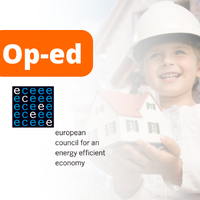Op-ed: Technical Assistance: the wealth-enabler for buildings (ECEEE)
Published by ECEEE on: 28 September 2021 | With most of the National Recovery Plans approved this summer, attention is turning to the core business at hand: spending the money fast, and properly on building renovations. Technical Assistance will be crucial in driving up the rate and depth of renovations across the EU, making sure we leave no one behind.
Why and How is Technical Assistance the Wealth-enabler for buildings?
Renovate Europe co-organised the webinar “Why and How is Technical Assistance the Wealth-enabler for buildings?”, which took place on Tuesday 28 September 2021 (10:30-11:50 CET) via GoToWebinar.
Historic amounts of funding will be made available through the EU budget (RRF and MFF), and the main buildings-related legislation (EED and EPBD) will be strengthened to deliver on the Renovation Wave goals. Unfortunately, the crucial role of Technical Assistance in delivering renovation schemes is still vastly underestimated.
Technical assistance or capacity building will be crucial in transforming EU objectives into tangible renovation schemes on the ground, and could significantly improve the absorption rates of EU funding across the Member States. It will also be essential in ensuring that renovations schemes are made accessible for the vulnerable.
This webinar, co-organised by Renovate Europe, FEDARENE and Energy Cities, was the opportunity to better understand the importance of technical assistance, through learnings from ongoing programmes but also through examples of funding opportunities, so renovation schemes can deliver better results for citizens, businesses, and the environment.
Agenda
10:30 | Opening remarks: Why technical support is key in driving energy renovations
Adrian Joyce, Renovate Europe Campaign Director (moderator)
10:35 | Learnings from the MFF: How and why to prioritise Technical Assistance in rolling out renovation schemes:
Mathieu Fichter, DG REGIO
10:45 | Applying for EU Technical Support to implement the Renovation Wave
– Technical Support from DG REFORM: Kaspar Richter, DG REFORM
– European City Facility: Stimulating local investments in the energy transition: Mariangela Luceri, FEDARENE
11:05 | Q&A session
11:15 | Making Technical Assistance available at National, Regional and Local level
– Intervention by Peter Schilken, Energy Cities
– The contribution of the French Caisse des Dépôts Climate Plan for a Green Recovery and the importance of local technical assistance for building renovation: Caroline François-Marsal, Caisse des Dépôts Group
– The key role of Technical Assistance in the context of the EPBD revision: Jessica Glicker, BPIE
11:35 | Q&A session
11:45 | Wrap-up by Moderator
* A short video showcasing best practices will be shown during the webinar.
Webinar: Why and How is Technical Assistance the Wealth-enabler for buildings?
Renovate Europe is delighted to announce the webinar “Why and How is Technical Assistance the Wealth-enabler for buildings?”, which is taking place on Tuesday 28 September 2021 (10:30-11:50 CET) via GoToWebinar.
Historic amounts of funding will be made available through the EU budget (RRF and MFF), and the main buildings-related legislation (EED and EPBD) will be strengthened to deliver on the Renovation Wave goals. Unfortunately, the crucial role of Technical Assistance in delivering renovation schemes is still vastly underestimated.
Technical assistance or capacity building will be crucial in transforming EU objectives into tangible renovation schemes on the ground, and could significantly improve the absorption rates of EU funding across the Member States. It will also be essential in ensuring that renovations schemes are made accessible for the vulnerable.
This webinar, co-organised by Renovate Europe, FEDARENE and Energy Cities will be the opportunity to better understand the importance of technical assistance, through learnings from ongoing programmes but also through examples of funding opportunities, so renovation schemes can deliver better results for citizens, businesses, and the environment.
Draft Agenda
10:30 | Opening remarks: Why technical support is key in driving energy renovations
Brook Riley, Vice-Chair Renovate Europe (moderator)
10:35 | Learnings from the MFF: How and why to prioritise Technical Assistance in rolling out renovation schemes:
Mathieu Fichter, DG REGIO
10:45 | Applying for EU Technical Support to implement the Renovation Wave
– Technical Support from DG REFORM: Kaspar Richter, DG REFORM
– European City Facility: Stimulating local investments in the energy transition: Mariangela Luceri, FEDARENE
11:05 | Q&A session
11:15 | Making Technical Assistance available at National, Regional and Local level
– The contribution of the French Caisse des Dépôts Climate Plan for a Green Recovery and the importance of local technical assistance for building renovation: Caroline François-Marsal, Caisse des Dépôts Group
– The key role of Technical Assistance in the context of the EPBD revision: Jessica Glicker, BPIE
11:35 | Q&A session
11:45 | Wrap-up by Moderator
* Short videos showcasing best practices will be shown throughout the webinar.
Guide: Applying for Technical Support to Implement the Renovation Wave

What is DG REFORM’s Structural Reform Support?
The Directorate-General for Structural Reform and Support (REFORM) is a new DG within the European Commission with the objective of helping EU countries to design and carry out structural reforms, e.g. when designing and implementing the National Recovery and Resilience Plans. The 2021-2027 long-term EU budget allocated nearly €1 billion to provide this type of tailor-made support, which could also significantly improve the absorption rates of EU funding across the Member States.
How does DG REFORM’s support differ from other available support from the EU?
DG REFORM’s support requires no co-financing from Member States. The support is not designed at the level of individual renovation projects but rather covers wider reforms along the entire process, from preparation and design to implementation.
How does DG REFORM’s support relate to buildings’ renovation?
Under the current call, DG REFORM provides flagship technical support for building renovation targeting EU countries wishing to design reforms implementing the EU Renovation Wave and long-term renovation strategies as well as reforms supporting the deployment of cohesion policy funding (see here).
More generally, DG REFORM offers technical support across a broad range of policy areas, including “sustainable growth and business environment” which handles climate and energy. For example, EU countries could request support for implementing national recovery plans, raising awareness, using innovative finance and digital instruments, and upskilling workers. Find more details on the policy areas concerned here.
Which applications for support have been chosen so far on buildings renovation?
- Public building energy efficiency plans and energy registry in Greece
- Energy efficiency awareness raising strategy in the Czech Republic
- Support on heating and cooling strategy in Slovenia
- Roadmap for scaling up energy efficiency investments in Hungary
- Establishing an energy efficiency expert platform in Poland
Find more examples of projects here.
How can I access DG REFORM’s Technical Support Instrument for my country?
- National Coordinating Authorities (specific Ministries and National Agencies) of Member States must submit a request to access the TSI by 31 October each year. DG REFORM can assist with the preparatory work before the final request has been lodged.
- DG REFORM selects the requests based on pre-defined criteria, and taking into account the expected reform impact and link to EU priorities.
- After successful selection, DG REFORM enters into dialogue with the national authorities to start the design and implementation of the projects.
Regional and local authorities are also eligible for technical support from the Commission. They submit their technical support request through their national coordinating authority.
Main contact point for applying for the Technical Support Instrument:
E-mail: REFORM-TSI@ec.europa.eu
Twitter: @EU_reforms
Op-ed: Public Buildings: The starter cog for the Renovation Wave (ECEEE)
Published by ECEEE on: 20 July 2021 | The review of the EED is an essential cog as the EU gears itself up to at least double the overall renovation rate from its paltry ~1% by the end of the decade, as part of the “Renovation Wave Strategy”. Ensuring public buildings are front and centre in our renovation efforts is an indispensable step.
EPBD revision: How to boost renovation rates and depth in the EU

The revision of the Energy Performance of Buildings Directive (EPBD) is a necessary pre-condition to meet the Renovation Wave objectives and to achieve a highly energy efficient and decarbonised building stock by 2050. The stubbornly low renovation rates and depth across the EU to date calls for the need to strengthen the European regulatory and non-regulatory measures for energy renovations in the EPBD.





